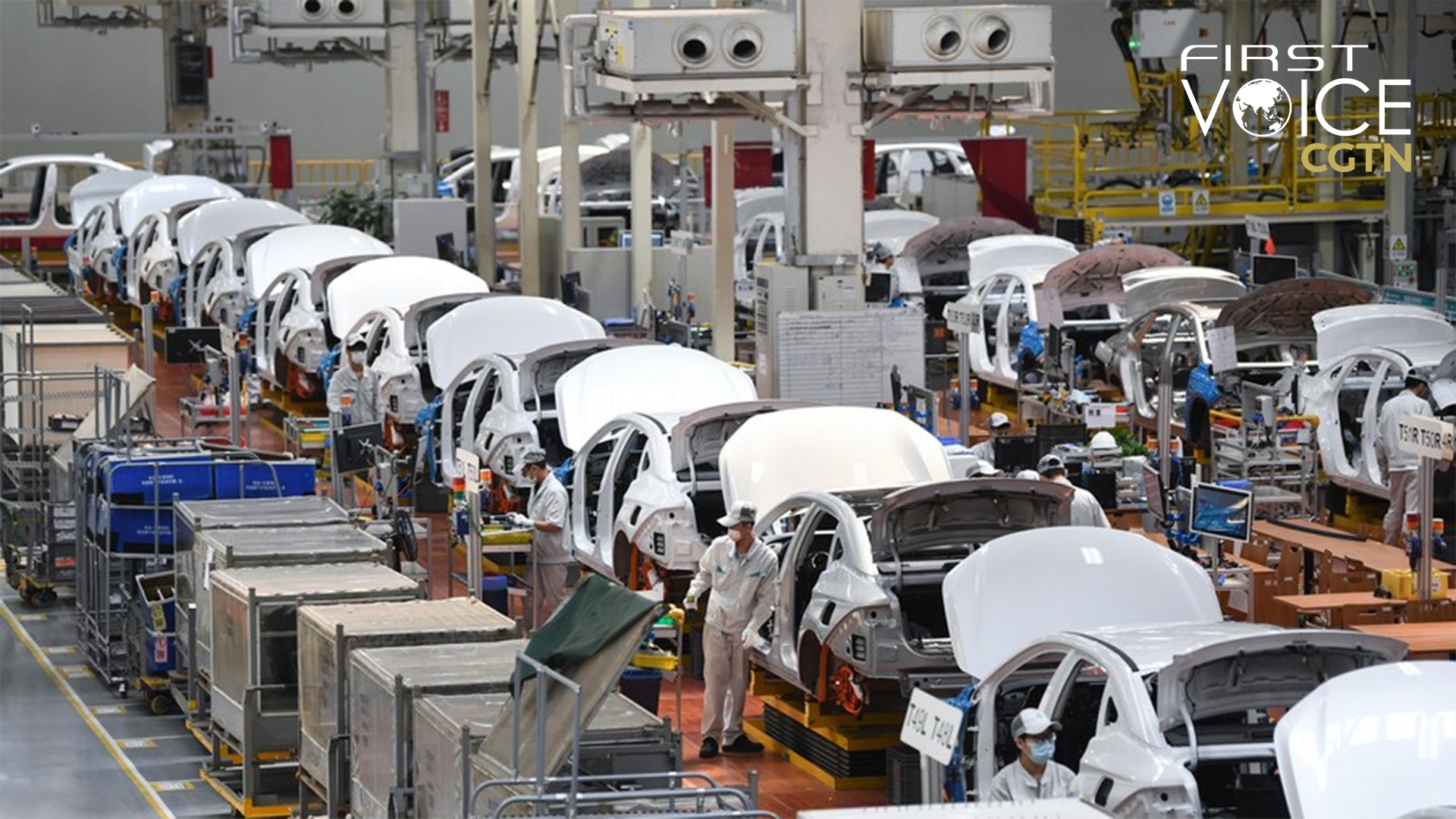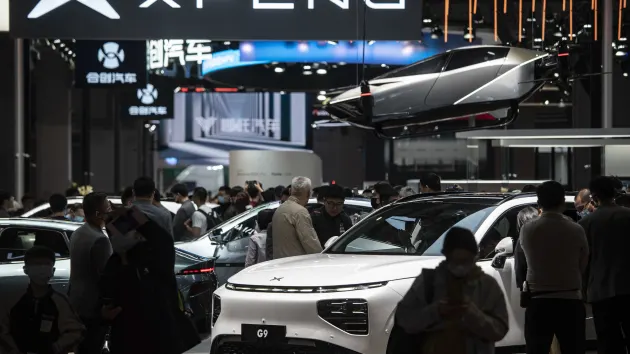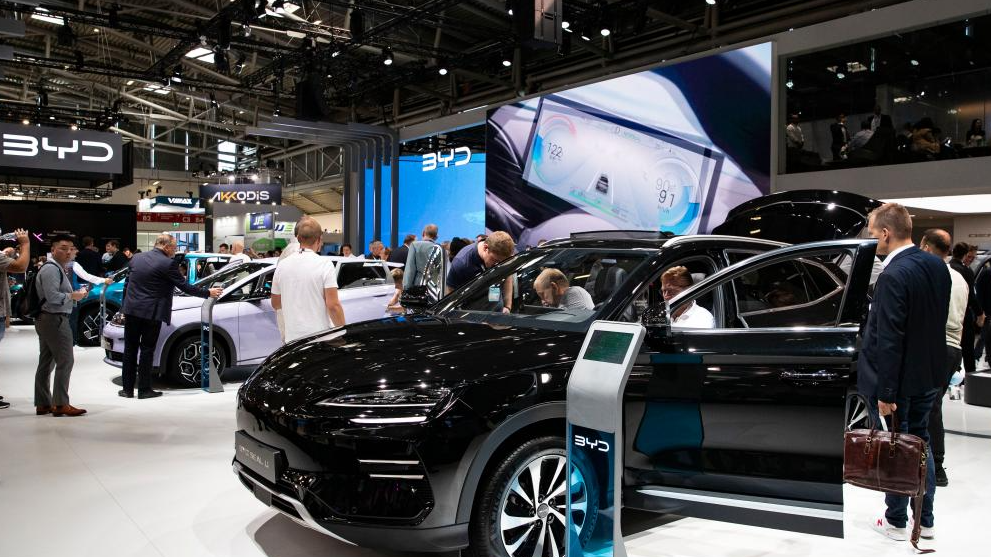
Editor's note: CGTN's First Voice provides instant commentary on breaking stories. The column clarifies emerging issues and better defines the news agenda, offering a Chinese perspective on the latest global events.
Recently, European Commission President Ursula von der Leyen announced the initiation of an anti-subsidy investigation on the import of Chinese electric vehicles (EV) into the European Union. What is an anti-subsidy investigation? It sounds very familiar, doesn't it? Actually, the European Union in recent years has launched a number of anti-dumping and anti-subsidy investigations against Chinese products, including cell phones, photovoltaic equipment, commercial aircraft, home appliances and so on.
The reason given by the EU for launching such an investigation is that the prices of EVs from China have been "kept artificially low by huge state subsidies," which is "distorting" the EU market. So, is this true?
The Chinese government announced it would stop providing subsidies to buyers of electric vehicles (EVs) on the last day of 2022. According to a report by Dutch Rabobank, EU countries still issue a wide variety of subsidies for EVs, including tax benefits and purchase incentives. Currently, the comprehensive subsidies for each electric car in EU countries range from 3,000-9,000 euros ($3208-$9624). Last year's U.S. Inflation Reduction Act doubled down on that subsidy race, splurging $369 billion to boost the EV industry, including $7,500 in premiums for motorists. Who receives the huge state subsidies? The answer is clear.
According to China Association of Automobile Manufacturers, Chinese EVs sold in Europe has risen from 3 percent in 2020 to 8 percent in 2023, and could reach 15 percent in 2025. Exports of Chinese EVs to Europe have risen to 230,000 units in the first seven months of 2023, and are on an increasing trajectory.
The rise of Chinese electric vehicles in Europe relies on China's manufacturing capacity, not just their price advantage. The British HSBC report in July pointed out that although Chinese automakers have the ability to carry out a "price war" in Europe, the dominance of Chinese EVs in the European market depends less on price than on production capacity. China's electric vehicle market is becoming increasingly competitive because of the rapid iteration of new products, constantly broadening the product line, as well as range and overall performance. If one looks at how quickly certain types of vehicles are updated for example, the update of fuel cars is generally around 7 years in EU countries and 3-4 years in China, while for electric vehicles it only takes1-2 years in China.
The rise of Chinese electric vehicles in the European market is based on the ability to meet market demand and adapt to user characteristics rather than purely a price advantage. On the contrary, Chinese automakers have no intention of lowering prices in the existing European auto market, as they do not want their products to be labeled as "low-quality and low-priced" in Europe.

An XPeng Inc. G9 electric vehicle at the Shanghai Auto Show in Shanghai, China, April 24, 2023. /Getty
An XPeng Inc. G9 electric vehicle at the Shanghai Auto Show in Shanghai, China, April 24, 2023. /Getty
Therefore, China's new energy vehicle enterprises have not received the so-called government subsidies as stated by the EU, and do not have the intention of lowering prices in the existing European auto market. So, the question remains: why is the EU claiming that China's EVs are "distorting" the market?
It all goes back to a report in the New York Times in early September during the International Motor Show in Munich, Germany. The article entitled "China is flooding the world with cars" said that China's cars are coming over in full force, trying to enter the European market. Germany's Munich International Motor Show allowed Europe to see the speed of China's automobile development, thus creating a sense of crisis over Europe's underdeveloped EV industry.
It has been very difficult for the European auto industry to transition to EV. This is due to many reasons: the late start of the new energy vehicle industry chain in Europe, traditional car companies are quite large, and the development cost of new energy vehicles is much higher than that of traditional fuel vehicles. A Financial Times analysis pointed out that European car companies are not ready for the transition. Therefore, it is not difficult to see that the core of the anti-subsidy investigation is to protect the local auto industry.

People visit the booth of Chinese carmaker BYD during the 2023 International Motor Show, officially known as the IAA MOBILITY 2023, in Munich, Germany, September 5, 2023. /Xinhua
People visit the booth of Chinese carmaker BYD during the 2023 International Motor Show, officially known as the IAA MOBILITY 2023, in Munich, Germany, September 5, 2023. /Xinhua
However, this "protection" has raised concerns. The German government believes that this kind of cocooning behavior may trigger China's reciprocal counterattacks, injuring the development of the European automotive industry in China. Mercedes-Benz, Bosch and other German companies have spoken out, saying "trade protectionism" will only result in a lose-lose situation. The European Union Chamber of Commerce in China also expressed a high degree of concern, emphasizing that the European side should objectively look at the development of China's electric vehicle industry rather than arbitrarily use unilateral economic and trade tools to prevent or increase the development and operating costs of China's electric vehicle products in Europe.
In recent years, China's electric vehicle industry has been developing rapidly and improving its competitiveness, and this has been welcomed by global users, including EU consumers. It has also contributed greatly to the green transition and the global fight against climate change. In fact, after years of development, the automotive industries in China and Europe have formed a relationship of "I scratch your back, and you scratch mine," and there will be more areas for extensive cooperation of common interests in the future.
In the common response to climate change, to achieve carbon neutrality, to resist global responsibility of trade protectionism, China and Europe should work together to utilize their existing mechanisms and modes of cooperation for the common development of the global electric vehicle industry to create a fair, non-discriminatory, predictable market environment. The old-fashioned economic warfare strategy of countervailing subsidies can be put to rest!
(If you want to contribute and have specific expertise, please contact us at opinions@cgtn.com. Follow @thouse_opinions on Twitter to discover the latest commentaries in the CGTN Opinion Section.)